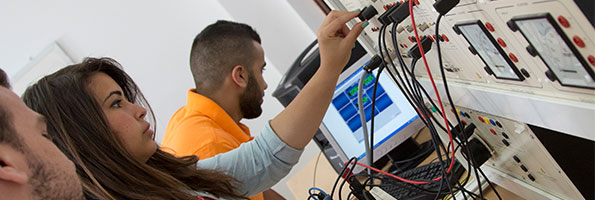
Electrical Engineering is the field of engineering that deals with the study and applications of power engineering, electronics, control systems, signal processing, computers, and, telecommunications. Electrical power engineering deals with the problems associated with electrical energy systems such as power generation, transmission, distribution and machine control, whereas electronic engineering deals with the study of small-scale electronic systems including computers, communication, and integrated circuits. The student joins the Electrical Engineering department as soon as he successfully completes 34Cr.Hrs of the basic subjects in the preparatory year (level 1).The student has to pass two years of study {equivalent to 70 Cr. Hrs}.of compulsory courses designed to provide him with a solid background and broad knowledge in electrical engineering .At the end of the two years (Levels 2&3), the electrical engineering student has to join one of the following two major specialization programs: 1.Electronics and Communication Engineering program, and 2.Electrical Power Engineering ,where he continues his studies to attain additional 72 Cr.Hrs. {Level 4&5}.
The first program gives the basic and advanced knowledge in the following domains: electromagnetic field theory, communication theory, advanced transmission techniques. The program includes as well the principles and practice of electronic devices and circuits. The second program gives the basic and advanced knowledge in the following domains: electrical power systems, electrical machines, power electronics, and renewable energy systems.
The department staff incorporates highly qualified professors graduated from distinguished Egyptian, European and Canadian universities.
The department possesses a set of advanced laboratories in different disciplines equipped with up to date equipment, instruments, and measuring systems
The main qualities that are needed to study “the program”
To study the Electrical Power Engineering program, the student should have a good background and fair preferences in Mathematics and Physics.
The Educational Philosophy
The core values of the program are:
-
Leadership and innovation
-
Integrity and transparency
-
Justice, accountability, and governance
-
Social responsibility
-
Sustainable development
Overview of the Program
The Electrical Power Engineering Program at Future University in Egypt is a four-year, 164 Credit Hours (CH) program consisting of ten semesters. The curriculum includes both compulsory and elective courses, allowing students to tailor their education to their interests. The program incorporates SIX educational modules:
-
University requirements module of 12 CH, including two English language courses and four humanity courses, two compulsory and two electives.
-
Faculty requirements module of 32 CH, including: 2 math courses, 2 physics courses, 1 chemistry course, 1 mechanics course, 1 graphics course, and 2 humanity courses.
-
Department requirements module of 59 CH, including the following areas: electrical circuits, electronics, logic/digital circuits and microcontrollers, electromagnetic fields, signals and systems, measurements, control systems, math, physics, and project management and economics.
-
Department requirements module of 55 CH, consisting of 45 CH compulsory course in addition to 5 elective courses, each of 2 CH. The compulsory courses cover the following areas: electrical machines, power electronics, motor drives and PLC, power transmission and distribution, power system analysis, switchgear and substations, power system protection, operation and control, and renewable energy systems.
-
The graduation project of 5 CH divided into 2 semesters.
-
The practical training of 240 training hours divided into 3 training modules each 80 hours, and is counted as 1 CH.
Added value for studying “the program” in terms of skills
At the time of graduation, the Electrical Power Engineering students will attain the following:
-
ability to identify, formulate, and solve complex engineering problems by applying principles of engineering, science, and mathematics.
-
ability to apply engineering design to produce solutions that meet specified needs with consideration of public health, safety, and welfare, as well as global, cultural, social, environmental, and economic factors.
-
ability to communicate effectively with a range of audiences.
-
ability to recognize ethical and professional responsibilities in engineering situations and make informed judgments, which must consider the impact of engineering solutions in global, economic, environmental, and societal contexts.
-
ability to function effectively on a team whose members together provide leadership, create a collaborative and inclusive environment, establish goals, plan tasks, and meet objectives.
-
ability to develop and conduct appropriate experimentation, analyze and interpret data, and use engineering judgment to draw conclusions.
-
ability to acquire and apply new knowledge as needed, using appropriate learning strategies.
Career opportunities (what awaits the student after graduation?)
Graduates of the Electrical Power Engineering Program at Future University in Egypt are prepared for careers in a wide range of industries, including:
-
Electrical power generation, transmission, and distribution companies
-
Electrical equipment manufacturing companies
-
Renewable energy companies
-
Consulting firms
-
Government agencies
-
Construction and engineering firms
-
Industrial automation and control companies
-
Research and development organizations
-
Academic and educational institutions
-
Non-profit organizations involved in energy and sustainability initiatives
-
Oil and gas companies
-
Facilities management companies
Graduates of the program can pursue various roles, including electrical engineer, power systems engineer, control engineer, project engineer, research and development engineer, consulting engineer, and more. They may work on designing, testing, installing, operating, and maintaining electrical power systems and equipment, as well as implementing and managing sustainable energy solutions.
Students' training and research
The practical training of 240 training hours, which is counted as 1 CH, is a compulsory component of the program. It is divided into 3 training modules each 80 hours,
